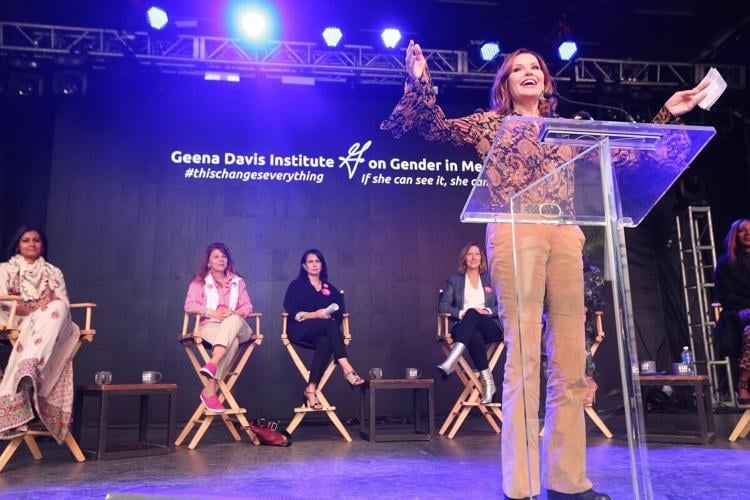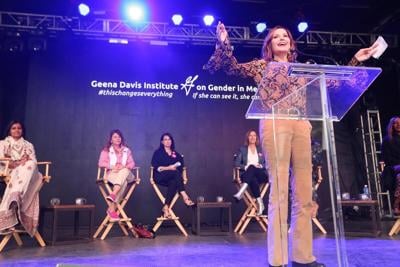Hundreds of film industry workers and fans issued a call to action Saturday at the ║ŻĮŪ╔ńŪ°╣┘═°International Film Festival during a landmark rally aimed at moving the needle on gender equality on both sides of the camera.
The public event called Share Her Journey featured a roster of high-profile speakers including actor-director Geena Davis and Oscar-winning producer Cathy Schulman to drive home the message that the #MeToo movement may have boosted awareness but the time for talk is over.
DavisŌĆÖs activism around gender and media began when she noticed the bias in the kidsŌĆÖ TV programs her young daughter watched. Program executives didnŌĆÖt believe her so she set out to collect the data to prove there was bias in the onscreen depictions aimed at young children.
ŌĆ£I feel like this is the easiest fix. ItŌĆÖs the lowest hanging fruit in the panoply of problems we have and itŌĆÖs also the most urgent. Why are we teaching kids something we try so hard to get rid of later on,ŌĆØ she said, citing the motto of the Geena Davis Institute on Gender in Media: ŌĆ£If they see it they can be it.ŌĆØ
ŌĆ£A girl sees Hunger Games, she goes out and buys a bow. A woman sees CSI or X-Factor, she goes into the STEM fields,ŌĆØ said Davis.
University of Southern California professor Stacy Smith, who works with the DavisŌĆÖs institute, brought academic heft and statistics to the stage on John St. near the film festivalŌĆÖs King St. headquarters.
Read more:

The crowd cheers as the ║ŻĮŪ╔ńŪ°╣┘═°International Film Festival hosts a Share Her Journey Rally for Women in Film. at Roy Thompson Hall in Toronto.
Steve Russell / ║ŻĮŪ╔ńŪ°╣┘═°StarAmong the statistics Smith cited: Of 1,100 films over the last 11 years, only four per cent had female directors. Of 1,223 directors, only 11 were women of colour and, of the top 100 films of 2017, only four leading characters were women of colour. Among 59,715 film reviews, only four per cent were written by women of colour.
ŌĆ£This needs to change now,ŌĆØ said Smith.
The event was held at the first TIFF since movie mogul Harvey Weinstein was toppled by sexual assault allegations. Festival organizers signalled their support for the ensuing push for human rights and zero tolerance. Before the Share Her Journey rally, artistic director Cameron Bailey pledged TIFFŌĆÖs support for a broader industry gender parity movement called 50/50 by 2020.
The Directors Guild of Canada also used TIFF to launch a national campaign called ŌĆ£So Not Cool,ŌĆØ which encourages bystanders, actors and film crews to build safe, respectful environments on and off movie sets.
Sundance Insitute executive director Keri Putnam told the rally she has witnessed discrimination in the back rooms of the industry she loves.
ŌĆ£I watched as talented women directors who stood up for their vision were called difficult, while men who did the same were called visionary,ŌĆØ Putnam said.
ŌĆ£I noticed that white male directors got new assignments even when their work was mediocre while most women struggled to build their careers, and I found that when budgets and stakes on my projects got higher, the corporate appetite for hiring diverse voices faded.ŌĆØ

Filmmaker Nandita Das speaks at the ║ŻĮŪ╔ńŪ°╣┘═°International Film Festival hosts a Share Her Journey Rally for Women in Film. Hundreds of film industry workers and fans issued a call to action Saturday at the landmark rally.
Steve Russell / ║ŻĮŪ╔ńŪ°╣┘═°StarWomenŌĆÖs progress is inhibited by the myths that there is a talent shortage ŌĆö ŌĆ£the shortage has been in the jobs (women) have been offered that would have provided them the same experience as their male peers,ŌĆØ said Smith.
The other prevailing myths are that women arenŌĆÖt leaders, that they are too emotional and indecisive, and that womenŌĆÖs stories are not commercially viable.
ŌĆ£Women directors are 50/50 in film schools but make up only 17 per cent of SundanceŌĆÖs feature film submissions and women of colour even less,ŌĆØ she said.
║ŻĮŪ╔ńŪ°╣┘═°writer-producer Amelia Egan, 31, and her partner and collaborator Ian Gibson went to the rally with son Aurelius, carrying a sign that said, ŌĆ£Why is my mom still paid less than those guys?ŌĆØ
Not much has changed in Canada since the advent of #MeToo, said Egan, who writes mostly womenŌĆÖs stories ŌĆö ŌĆ£stories about female poverty, stories that we just donŌĆÖt see and hear that are not necessarily sexy but are real and represent my culture.ŌĆØ
ŌĆ£Access to funds is hard unless youŌĆÖve already produced a feature in the Canadian system,ŌĆØ said Egan. ŌĆ£ItŌĆÖs a struggle to get male producers to pay attention to your stories. Everyone wants to produce films about men killing men and women.ŌĆØ
But she said she is hopeful.
ŌĆ£I just heard about a Sundance program that IŌĆÖm going to go home and apply to,ŌĆØ said Egan. ŌĆ£It seems like the mobilization is happening.ŌĆØ


































To join the conversation set a first and last name in your user profile.
Sign in or register for free to join the Conversation